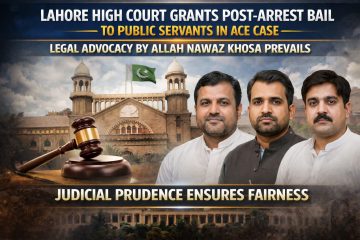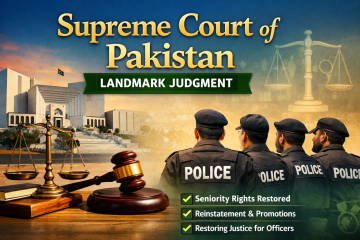[Supreme Court of Pakistan]
Present: Yahya Afridi, Sayyed Mazahar Ali Akbar Naqvi and Muhammad Ali Mazhar, JJ
NAVEED SATTAR—Petitioner
Versus
The STATE and others—Respondents
Criminal Petition No. 317-L of 2023, decided on 20th September, 2023.
(On appeal against the order dated 14.02.2023 passed by the Lahore High Court, Lahore in Criminal Miscellaneous No. 48864-B of 2022)
(a) Criminal Procedure Code (V of 1898)—
—-S. 497(2)—Penal Code (XLV of 1860), 302, 34, 118, 120-B, 109 & 506—Constitution of Pakistan, Art. 185(3)—Murderous assault—Bail, grant of—Further inquiry—After registration of FIR, the complainant recorded four supplementary statements—In the first three supplementary statements, the complainant did not nominate the petitioner as an accused—However in her fourth supplementary statement, recorded after a lapse of more than four months of the occurrence, she did nominate the petitioner for the first time—Bare look of the crime report and the subsequent four supplementary statements recorded by the complainant shows that she kept changing her stance—It appears there is no direct evidence against the petitioner and the prosecution case hinges upon circumstantial evidence—Petitioner is behind bars for the last more than 20 months—Case of the petitioner squarely falls within the ambit of section 497(2), Cr.P.C. entitling for further inquiry into his guilt—Petition for leave to appeal was converted into appeal and allowed and petitioner was admitted to bail.
(b) Criminal Procedure Code (V of 1898)—
—-S. 497(2)—Penal Code (XLV of 1860), 302, 34, 118, 120-B, 109 & 506—Qanun-e-Shahadat (10 of 1984), Art. 22—Constitution of Pakistan, Art. 185(3)—Murderous assault—Bail, grant of—Identification parade—Identification parade was conducted after petitioner’s nomination by the complainant and in such circumstances, prima facie the sanctity of such test identification parade is open for determination—Petition for leave to appeal was converted into appeal and allowed and petitioner was admitted to bail.
(c) Criminal Procedure Code (V of 1898)—
—-S. 497(2)—Penal Code (XLV of 1860), 302, 34, 118, 120-B, 109 & 506—Constitution of Pakistan, Art. 185(3)—Murderous assault—Bail, grant of—Call Data Record (CDR)—So far as the Call Data Record (CDR) is concerned, in absence of any concrete material the CDR is not a conclusive piece of evidence to ascertain the guilt or otherwise of an accused—Petition for leave to appeal was converted into appeal and allowed and petitioner was admitted to bail.
(d) Criminal Procedure Code (V of 1898)—
—-S. 497(2)—Penal Code (XLV of 1860), 302, 34, 118, 120-B, 109 & 506—Constitution of Pakistan, Art. 185(3)—Murderous assault—Bail, grant of—Photographs allegedly connecting the petitioner with the commission of the crime—Nothing is available on record to show that said photographs were ever sent for forensic examination, therefore, it is unsafe to rely upon the same as a piece of evidence in a court of law—Petition for leave to appeal was converted into appeal and allowed and petitioner was admitted to bail.
Ishtiaq Ahmed Mirza v. Federation of Pakistan PLD 2019 SC 675 ref.
(e) Criminal Procedure Code (V of 1898)—
—-S. 497—Constitution of Pakistan, Art. 185(3)—Bail—Benefit of doubt—Benefit of doubt can even be extended at bail stage.
Muhammad Ejaz v. The State 2022 SCMR 1271; Muhammad Arshad v. The State 2022 SCMR 1555 and Fahad Hussain v. The State 2023 SCMR 364 ref.
(f) Criminal Procedure Code (V of 1898)—
—-Ss. 497(2) & 156—Penal Code (XLV of 1860), 302, 34, 118, 120-B, 109 & 506— Constitution of Pakistan, Art. 185(3)—Murderous assault—Bail, grant of—Opinion of police during investigation—Relevance—Although the petitioner was found involved during police investigation but it is settled law that ipse dixit of the police regarding the guilt or innocence of an accused could not be depended upon as the same would be determined by Trial Court on the basis of evidence available on record—Petition for leave to appeal was converted into appeal and allowed and petitioner was admitted to bail.
Humayoun Rashid, Advocate Supreme Court (through video link from Lahore) for Petitioner.
Irfan Zia, D.P.G. and Wahid and Iqbal, SI for the State.
Complainant in person.
Date of hearing: 20th September, 2023.
JUDGMENT
SAYYED MAZAHAR ALI AKBAR NAQVI, J.—Through the instant petition under Article 185(3) of the Constitution of Islamic Republic of Pakistan, 1973, the petitioner has assailed the order dated 14.02.2023 passed by the learned Single Judge of the learned Lahore High Court, Lahore, with a prayer to grant post-arrest bail in case registered vide FIR No. 406/2021 dated 17.07.2021 under sections 302/ 34/118/120-B/109/506, P.P.C. at Police Station B-Division, District Kasur, in the interest of safe administration of criminal justice.
2. Briefly stated the prosecution story as narrated in the crime report is that in the night of 17.07.2021, three unknown persons entered in the house of the complainant and murdered her son by making fires on his right leg below the abdomen. On the same day, the complainant got lodged the FIR against the unknown persons. On 25.08.2021, 30.10.2021 and 15.11.2021, the complainant got recorded her supplementary statements under section 164, Cr.P.C. wherein she did not nominate the petitioner as an accused. However, subsequently she recorded yet another statement on 22.11.2021 wherein she nominated the present petitioner for the first time. The petitioner was arrested on 27.11.2021 whereafter he applied for post-arrest bail before the learned Trial Court as also before the learned High Court but could not get the relief sought for. Hence, this petition.
3. At the very outset, it has been argued by learned counsel for the petitioner that the petitioner has been falsely roped in this case against the actual facts and circumstances. Contends that the allegations levelled against the petitioner are false, frivolous, baseless, concocted and the prosecution story is not worthy of credit. Contends that the complainant nominated the petitioner in her fourth supplementary statement after a period of four months, which shows her mala fides. Contends that the photographs allegedly connecting the petitioner with the commission of the crime were never sent for forensic examination, therefore, they cannot be relied upon to determine the guilt of the petitioner. Lastly contends that the learned High Court while declining bail to the petitioner has not followed the guidelines issued by this Court for the safe administration of criminal justice, therefore the same may be set at naught and the petitioner may be released on bail.
4. On the other hand, learned Law Officer assisted by the complainant in person opposed the petition by contending that the petitioner has specifically been nominated by the complainant while recording her supplementary statement and he was found involved during police investigation, therefore, he does not deserve any leniency from this Court.
5. We have heard learned counsel for the parties at some length and have perused the available record with their able assistance.
As per the contents of the crime report, on 17.07.2021 at 02:50 a.m. (night), three unknown persons entered in the house of the complainant and murdered her son by making fires on his right leg below the abdomen. On the same day, the complainant got registered the FIR against the unknown persons. We have noted that subsequently the complainant got recorded three supplementary statements on 25.08.2021, 30.10.2021 and 15.11.2021 wherein she did not nominate the petitioner as an accused. However, on 22.11.2021 she recorded another statement after the lapse of more than four months wherein she nominated the present petitioner for the first time. A bare look of the crime. report and the subsequent four supplementary statements got recorded by the complainant shows that the complainant remained changing her stance. The identification parade was conducted after petitioner’s nomination by the complainant and in such circumstances, prima facie the sanctity of such test identification parade is open for determination. So far as the Call Data Record (CDR) is concerned, this Court in a number of cases has held that in absence of any concrete material the CDR is not a conclusive piece of evidence to ascertain the guilt or otherwise of an accused. Similarly, there is nothing on record to show that the photographs allegedly connecting the petitioner with the commission of the crime were ever sent for forensic examination, therefore, in view of the law laid down by this Court in Ishtiaq Ahmed Mirza v. Federation of Pakistan (PLD 2019 SC 675) it is unsafe to rely upon the same as a piece of evidence in a court of law. It appears there is no direct evidence against the petitioner and the prosecution case hinges upon the circumstantial evidence. The fundamental principle of universal application in cases dependent on circumstantial evidence is that in order to justify the inference of guilt of an accused, the incriminating fact must be incompatible with the innocence of the accused and incapable of explanation upon any other reasonable hypothesis than that of his guilt. The cumulative effect of all these aspects creates a doubt in the genuineness of prosecution version. It is settled principle of law that benefit of doubt can be even extended at bail stage. Reliance is placed on Muhammad Ejaz v. The State (2022 SCMR 1271), Muhammad Arshad v. The State (2022 SCMR 1555) and Fahad Hussain v. The State (2023 SCMR 364). Although the petitioner was found involved during Police investigation but it is settled law that ipse dixit of the Police regarding the guilt or innocence of an accused could not be depended upon as the same would be determined by Trial Court on the basis of evidence available on record. The petitioner is behind the bars for the last more than 20 months. This court in a number of cases has held that liberty of a person is a precious right, which has been guaranteed under the Constitution of Islamic Republic of Pakistan, 1973, and the same cannot be taken away merely on bald and vague allegations. Taking into consideration all the facts and circumstances stated above, we are of the view that the case of the petitioner squarely falls within the ambit of section 497(2), Cr.P.C. entitling for further inquiry into his guilt.
6. For what has been discussed above, we convert this petition into appeal, allow it and set aside the impugned order. The petitioner is admitted to bail subject to his furnishing bail bonds in the sum of Rs.200,000/- with one surety in the like amount to the satisfaction of learned Trial Court. Before parting with the order, we may observe that the observations made in this order are tentative in nature and would not prejudice the proceedings before the Trial Court.
MWA/N-15/SC Bail granted.
Employee on Reinstatement Entitled to Back Benefits — Lahore High Court
Case Title Nadia Kanwal vs. The Chancellor, University of Sargodha / Governor of Punjab & another Date of Hearing 19 January 2026 Bench Hon’ble Mr. Justice Muhammad Sajid Mehmood SethiLahore High Court Background of the Read more



0 Comments